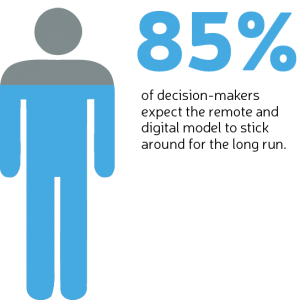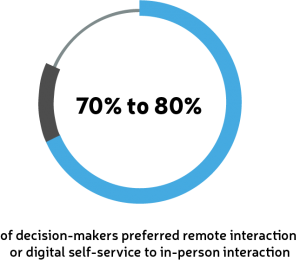The remote sales process – a new way forward
When it comes to sales and selling, the traditional process has always been driven by face-to-face interactions between salespeople and buyers.
People buy from people has been the underpinning statement behind all instinctive sales philosophies, and it has served salespeople and businesses well for a long, long time.
However, in recent years, ever-advancing technology and digital communications have slowly influenced these traditional views.
E-mail and text have long been established forms of business communications and video calls are now readily accessible and utilised by the remote working community.
Even with so much advancing technology available, the long-held tradition of gaining face-to-face meetings with buyers or decision-makers was still held up as the most effective way of building rapport, establishing the relationship and making the sale.
However, it’s taken the global pandemic of 2020 to really test the theory.
As a result of enforced lockdowns, remote working has meant an instant shift to video conference for everyone. The use of Google Meet, Zoom and Teams, to name but a few, became the norm for many people overnight.

Now that people and businesses have adjusted, how has the new way of working affected the sales process? And, what will the post-COVID decision-maker or buyer require?
What are buyers expecting?
We recently published a blog on changing buyer behaviours, highlighting how much more difficult the buyers’ decision process had become. Whilst the article focussed on buyer behaviours, it also highlighted the potential influence of the COVID pandemic on the future of the sales process.
According to McKinsey & Company’s recent research, the tide has turned, and B2B sales are already changed forever.
McKinsey is conducting regular global surveys to track changes in opinions and behaviours throughout the pandemic. Their latest data (October 2020) suggests that digital interaction is the way forward when it comes to spending and buyer behaviour.
According to McKinsey’s’ UK research, over 85% of decision-makers expect the remote and digital model to stick around for the long run, and 3 in 4 believe the new model is as effective or more so than before COVID-19 (for both existing customers and prospects).

Additionally, only 15–25% of B2B buyers expressed a desire to ever interact with reps in person, even in their ideal post-COVID-19 model. The overwhelming preference was for a videoconference with 3 out of 4 buyers identifying this as critical and preferable to audio/phone.
Fairly conclusive evidence, it would appear, that a remote sales process is here to stay, like it or not.
The influence of technology and data
So what does this mean for businesses and salespeople?
The emergence of the digital, self-service model is evident, and demand appears to be growing. Many businesses have already adapted their service offering to incorporate a self-service option in the wake of the pandemic.
This consumer-style behaviour should not come as a surprise, however, as buyers had already adopted elements of this activity before the pandemic. In our previous blog, we stated that buyers are now comparing their professional buying experience with that of their personal consumer experience, with expectations increased as a result.
Customers will favour suppliers that create an inclusive and personal buying experience along with the easiest and simplest buying process.
According to McKinsey, Top sales innovators are embedding data and technology throughout their organisations to reimagine sales.
McKinsey states that with more data flowing in from nontraditional sources such as video calls and webinars — few of which are captured by current sales processes — understanding which customers to focus on, what they care about, and how they want to engage can often feel like a guessing game.
Their domino effect model identifies four critical areas to embed data and technology to re-imagine the sales process and take some of the guesswork away:
- Pool sales, strategy and technical talent to help identify and use data and analytics more effectively.
- Instigate agility into the sales response by pulling in the right people at the right stage of the process.
- Design smarter automated sales processes that streamline bid processes, identify buying signals and patterns and allow the salesperson to focus on core activities.
- Empower and reskill the salesforce to help them adapt to the new model.
According to McKinsey, some businesses are reporting double-digit gains on return on investment following the domino model’s implementation.
Thoughts from UK B2B decision-makers
When McKinsey surveyed B2B decision-makers in the UK energy sector, responses were as follows:
- Only 15% to 25% of decision-makers had in-person interaction with sales reps through the sourcing to ordering and reordering buying process.
- Between 70% and 80% of decision-makers preferred remote interaction or digital self-service to in-person interaction.
- 90% of businesses identified the need for building and developing skills for the in-person to remote transition.
- 68% of businesses identified a need to redesign sales training.
Remote or re-imagined, sales is changing
Whether it suits us or not, clear indicators are emerging that show how businesses sell, is changing.
Even before the pandemic, self-service and consumer-style patterns had emerged in buyer behaviours. The influence of evolving technologies and increasing data volumes are challenging the status quo and forcing organisations to question traditional methods.
With the additional challenges faced during 2020, it would seem sensible for organisations to review their sales functions and methods in the interests of retaining both competitive position and customers.
Salesworxs – helping you to enhance your sales & marketing performance.
At Salesworxs, we help businesses create sales & marketing messaging, tools and skills to suit their business and industry. Specialists in sales and marketing communications, we can support your business on a journey to drive sales performance in a complex and competitive sector.
With our expertise in sales and marketing, we can help you develop a value proposition that showcases your sales proposition with simple and compelling sales & marketing messaging.
To meet the demands of the changing sales environment, we exploit digitalisation to produce sales & marketing tools such as video, motion graphics, presentations, interactive documents or bespoke, shared web-based content.
Salesworxs can help you to drive sales performance excellence using simple and compelling sales and marketing messages tailored to your industry and sector. You can see more information on simplifying the sales message here.

back to blog next article
WANT TO KNOW MORE?
GET IN TOUCH
Find out how we can help your business? Give us a call.
